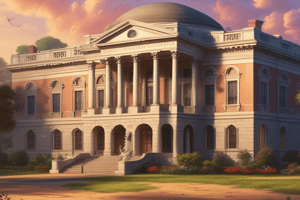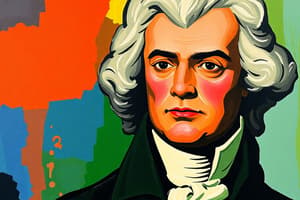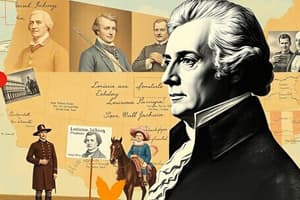Podcast
Questions and Answers
What was Thomas Jefferson's vision for an Agrarian Republic?
What was Thomas Jefferson's vision for an Agrarian Republic?
- A nation dominated by industrial factories
- A society of large landowners with extensive estates
- A government centered around urban developments
- A nation of small, independent farmers who owned their land (correct)
Which principle did Jefferson adhere to regarding the Constitution?
Which principle did Jefferson adhere to regarding the Constitution?
- Broad, implied interpretations of the federal government’s powers
- A flexible approach that allowed for expansive government authority
- Strict constructionism, exercising only explicitly stated powers (correct)
- An approach that favored state powers over federal powers
How did the Louisiana Purchase challenge Jefferson's strict constructionist views?
How did the Louisiana Purchase challenge Jefferson's strict constructionist views?
- It was mandated by Congress under the Elastic Clause
- The Constitution did not explicitly authorize land purchases (correct)
- It aligned perfectly with his constitutional interpretations
- It involved extensive negotiation with Native American tribes
What was the Embargo Act of 1807 intended to address?
What was the Embargo Act of 1807 intended to address?
What significant event resulted in a greater sense of American nationalism?
What significant event resulted in a greater sense of American nationalism?
Which of the following was a result of westward expansion?
Which of the following was a result of westward expansion?
What role did the Marshall Court play under Chief Justice John Marshall?
What role did the Marshall Court play under Chief Justice John Marshall?
What was Thomas Jefferson's response to the Barbary Pirates?
What was Thomas Jefferson's response to the Barbary Pirates?
What significant power was established by the ruling in Marbury v. Madison (1803)?
What significant power was established by the ruling in Marbury v. Madison (1803)?
What was the main purpose of Henry Clay's American System?
What was the main purpose of Henry Clay's American System?
Which event was a direct consequence of the Indian Removal Act under Andrew Jackson?
Which event was a direct consequence of the Indian Removal Act under Andrew Jackson?
What major impact did the Market Revolution have on American society?
What major impact did the Market Revolution have on American society?
What was the main goal of the Abolitionist Movement?
What was the main goal of the Abolitionist Movement?
Which of the following statements accurately describes the Era of Good Feelings?
Which of the following statements accurately describes the Era of Good Feelings?
What did the Monroe Doctrine proclaim regarding European involvement in the Western Hemisphere?
What did the Monroe Doctrine proclaim regarding European involvement in the Western Hemisphere?
What was one of the key outcomes of Andrew Jackson's opposition to the recharter of the Bank of the United States?
What was one of the key outcomes of Andrew Jackson's opposition to the recharter of the Bank of the United States?
Flashcards
Jefferson's Agrarian Republic
Jefferson's Agrarian Republic
Jefferson's vision of a nation where small farmers own land, promoting equality and republican values.
Strict Constructionism
Strict Constructionism
The belief that the federal government should only use powers explicitly stated in the Constitution.
Louisiana Purchase
Louisiana Purchase
Jefferson's 1803 acquisition of a vast territory from France, significantly expanding the U.S.
Elastic Clause
Elastic Clause
A constitutional clause allowing Congress to make necessary laws.
Signup and view all the flashcards
Westward Expansion Conflicts
Westward Expansion Conflicts
The movement of settlers westward, leading to conflicts with Native Americans over land.
Signup and view all the flashcards
Embargo Act of 1807
Embargo Act of 1807
Jefferson's ban on exports to foreign nations, hurting the U.S. economy.
Signup and view all the flashcards
War of 1812
War of 1812
Conflict between the U.S. and Britain, caused by impressment, trade disputes, and British support of Native Americans.
Signup and view all the flashcards
Impressment
Impressment
The British practice of forcing American sailors into the British navy.
Signup and view all the flashcards
Judicial Review
Judicial Review
The power of the Supreme Court to declare laws unconstitutional.
Signup and view all the flashcards
Interstate Commerce
Interstate Commerce
The exchange of goods and services between states.
Signup and view all the flashcards
Monroe Doctrine
Monroe Doctrine
A US policy that kept Europe out of the Western Hemisphere.
Signup and view all the flashcards
American System
American System
Henry Clay's plan for economic growth, focusing on internal improvements, manufacturing, and tariffs.
Signup and view all the flashcards
Indian Removal Act
Indian Removal Act
Forced relocation of Native Americans to the west.
Signup and view all the flashcards
Nullification Crisis
Nullification Crisis
A conflict where South Carolina refused to obey federal tariffs.
Signup and view all the flashcards
Second Great Awakening
Second Great Awakening
Religious revival emphasizing personal salvation and moral responsibility.
Signup and view all the flashcards
Abolitionist Movement
Abolitionist Movement
Activism for the end of slavery in the United States.
Signup and view all the flashcardsStudy Notes
Thomas Jefferson
- Agrarian Republic: Championed a nation of independent farmers, believing it fostered equality, virtue, and republican values.
- Strict Constructionist: Believed the federal government should only exercise explicitly stated powers in the Constitution.
- Louisiana Purchase (1803): Acquired the Louisiana Territory from France, doubling the U.S. size; challenged his strict constructionist views.
- Elastic Clause: Constitution's Article I, Section 8 clause enabling Congress to make "necessary and proper" laws; debated during the purchase.
- Westward Expansion: Purchase encouraged westward movement, causing conflicts with Native Americans.
- Native American Issues: Settler movement led to displacement, violence, and loss of Native American lands; resistance movements emerged.
- Barbary Pirates: North African pirates disrupted American trade; Jefferson used force to protect ships.
- Embargo Act (1807): U.S. response to British and French trade interference; prohibited exports, harming the economy and angering merchants.
War of 1812
- Second War for Independence: Conflict with Britain over impressment, trade restrictions, and British support of Native Americans; solidified American independence.
- Impressment: British practice of forcing American sailors into the British navy, a primary cause of the war.
- Hartford Convention: New England Federalists met to discuss potential secession due to opposition to the war.
- Nationalism: War spurred national unity, pride, and cultural developments in literature, art, and symbols.
John Marshall & the Marshall Court
- Increased Judicial Role: Chief Justice John Marshall strengthened federal power and established judicial review.
- Federalism: Often favored federal authority over states' rights.
- Marbury v. Madison (1803): Established judicial review, allowing the Supreme Court to declare laws unconstitutional.
- Gibbons v. Ogden (1824): Strengthened federal control over interstate commerce.
Era of Good Feelings
- Political Unity: Period following the War of 1812 marked by a lack of partisan conflict.
- Monroe Doctrine (1823): Declared the Western Hemisphere off-limits to European colonization, highlighting U.S. influence.
Henry Clay's American System
- Economic Plan: Strengthened the U.S. through internal improvements, domestic manufacturing, and protective tariffs.
- Internal Improvements: Roads and canals promoted infrastructure.
- Domestic Manufacturing: Protected by tariffs.
- Protective Tariff: Import taxes to aid domestic industries.
Market Revolution
- Economic Ties: Growth of trade and commerce connected different regions.
- Transportation: Roads, canals, and railroads reduced costs and travel time.
- Efficiency: Improvements made production cheaper and faster.
- New Towns/Cities: Greated around transportation hubs and industrial centers.
- Communication: Telegraph revolutionized communication.
- Industrialization: Factories, interchangeable parts, and mass production transformed the economy.
- Immigration: German and Irish immigration fueled labor needs, sparking nativism (Know-Nothing Party).
Andrew Jackson
- Indian Removal Act/Trail of Tears: Forced relocation of Native Americans to the west, resulting in significant loss of life.
- Nullification Crisis: South Carolina's attempt to reject federal tariffs, opposed by Jackson.
- Bank of the United States – Veto: Vetoed the national bank's recharter, considering it favored elite interests.
- Two-Party System: Democrats (Jackson's party) and Whigs emerged.
American Culture
- Influences: Inspired by European precedents and liberal ideas, reflecting American identity in art, literature, and education.
Reform Movements
- Second Great Awakening: Religious revival focused on personal salvation and moral responsibility, fostering reform.
- Women's Roles: Women advocated for temperance and abolition.
- Temperance Movement: Campaign to reduce alcohol consumption.
- Settlement House Movement: Focused on aiding immigrants and the poor.
- Women's Rights Movement: Advocated for voting rights and equality through the Seneca Falls Convention (1848).
- Abolitionist Movement: Advocated for the end of slavery.
Studying That Suits You
Use AI to generate personalized quizzes and flashcards to suit your learning preferences.




